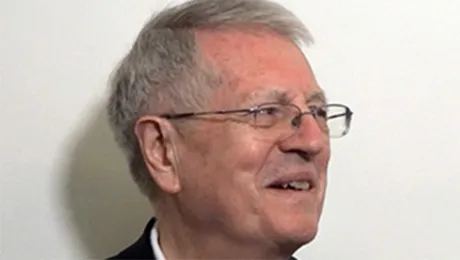
Trinity College's Dr Andrew Pierce, one of 70 theologians participating in LWF's conference on the global perspectives of the Reformation in Windhoek, Namibia. Photo: LWF/Iris Benesch
On Reformation Day, in addition to singing ‘A Mighty Fortress is our God,’ we marked Luther’s redecoration of Wittenberg’s famous castle door by focusing our discussions on religion and economics.
Famously, the Luther of history almost despaired of finding a merciful God: he was tortured by his incapacity to satisfy the demands of a nominalistically flavored deity through the means of grace offered by the contemporary discipline of penance. Nominalism, even in dilute form, breeds gods that are all-powerful rather than all-loving - they are rightly feared as fickle or arbitrary in their demands. Luther’s struggle ultimately led to his insights on justification by grace through faith, away from the capricious tyrant of nominalist theology and into the ‘mighty fortress’ of a merciful savior.
The demanding deity that Luther tried - and failed - to appease, sounds disturbingly like the Market (with a capital M) that makes its unfeeling and apparently arbitrary demands on a world of simple consumers. The prophets and scribes of the Market assure us that the Market follows certain, relatively clear-cut economic laws. But, again, just like theologians of the Christian God, magisterial interpreters of the Market lack an ecumenically agreed hymn sheet from which to sing. And the Market, like the nominalist’s God, sometimes does unexpected things: It rebuffs regulation, inflates against our will, crashes, and recovers.
This is, of course, a caricature. But it highlights how the world in which we live and move and have our being, is one shaped by an interplay of interconnecting forces—of which religion and economics stand out. These forces have generated a certain wisdom which needs to be heard and seen in all its complexity if we are at all serious about acting for social transformation.
Christians are concerned with how the world is, and how it could be; therefore we are concerned with economics, or we should be. There is, however, always a danger that Christian concern will ‘spiritualize’ the material, or the political or the economic, as a way of denying the significance of the material precisely as material, the political as political, and the economic as economic.
Prof. Gerald West noted how the ecclesial reception of the Lord’s Prayer—even within the pages of the New Testament—provides evidence of having shifted its meaning from a specific, concrete issue: deliverance from debt, to the more generalized and safely religious petition that we be forgiven our sins. Another remarkable insight today came from Prof. Tomás Sedlacek, an economist working in Prague, who pointed to the similarities between the issues raised and the language used in both the New Testament and in the pages of The Financial Times during the Greek bailout negotiations in Europe.
Theologians and economists alike venture into interpretations and evaluations of our world, how it works, how it should work, what our agency means, and so forth. Their conversations with one another may not always be easy, but the realities disclosed in presentations here over the past three days make it abundantly obvious that in all our societies theology, politics and economics all influence each other. Any contextual and transformative Christian theology is obliged to take the necessary trouble to understand that influence, and what it might become.
Dr Andrew Pierce, Assistant Professor at the Irish School of Ecumenics, Trinity College, University of Dublin, Ireland, was among the 70 theologians participating in the LWF conference on the global perspectives of the Reformation in Windhoek, Namibia.


